
Nature + Culture
Scope & Guideline
Connecting Cultural Narratives with Environmental Realities
Introduction
Aims and Scopes
- Interdisciplinary Research:
The journal emphasizes interdisciplinary approaches that integrate insights from anthropology, sociology, ecology, and cultural studies to understand the complexities of nature-culture relationships. - Environmental Justice and Ethics:
A core focus is on environmental justice, examining how social inequalities influence environmental policies and practices, and advocating for ethical considerations in ecological decision-making. - Cultural Perspectives on Nature:
Nature + Culture explores diverse cultural interpretations of nature, including indigenous perspectives, and how these shape human interactions with the environment. - Impact of Climate Change:
The journal consistently addresses the multifaceted impacts of climate change on societies, ecosystems, and cultures, analyzing both local and global responses. - Sustainable Practices and Innovations:
Research on sustainable practices, including agricultural innovations and conservation strategies, is a significant area of interest, highlighting pathways to ecological resilience.
Trending and Emerging
- Climate Activism and Advocacy:
Recent articles focus on climate advocacy, examining social movements and their impact on policy-making, reflecting a growing urgency to address climate change through collective action. - Gender and Environmental Issues:
There is an increasing emphasis on gendered perspectives in environmental studies, exploring how gender influences experiences and responses to ecological crises. - Urban Ecology and Social Change:
Research on urban ecology is gaining attention, particularly in relation to how cities adapt to environmental challenges and the role of social networks in fostering ecological resilience. - Posthumanism and New Ecologies:
The exploration of posthumanist perspectives is emerging, challenging anthropocentric views and examining the agency of non-human actors in ecological contexts. - Cultural Narratives in Environmental Discourse:
A trend towards analyzing cultural narratives and storytelling as powerful tools for understanding and addressing environmental issues is becoming increasingly prominent.
Declining or Waning
- Traditional Environmentalism:
Research centered around traditional environmentalism, which often emphasizes conservation without considering social implications, appears to be waning in favor of more integrated approaches that consider socio-cultural dimensions. - Static Nature-Culture Dichotomy:
The simplistic binary view of nature versus culture is losing traction, as newer research emphasizes the fluid and interconnected nature of human and ecological systems. - Historical Environmental Studies:
There is a noticeable reduction in publications focused solely on historical environmental studies, as contemporary issues and urgent challenges take precedence in the discourse. - Local vs. Global Dynamics:
The emphasis on purely local environmental issues without consideration of global interconnections is decreasing, reflecting a growing recognition of global environmental interdependencies.
Similar Journals
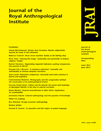
JOURNAL OF THE ROYAL ANTHROPOLOGICAL INSTITUTE
Illuminating the Rich Tapestry of HumanityJOURNAL OF THE ROYAL ANTHROPOLOGICAL INSTITUTE, published by Wiley, stands as a prestigious platform for scholarly discourse in the field of anthropology. With an ISSN of 1359-0987 and an E-ISSN of 1467-9655, this journal has been a vital resource for researchers, professionals, and students since its inception, featuring contributions that push the boundaries of understanding in both cultural and social anthropology. The journal’s rigorous peer-review process affirms its high academic standards, reflected in its top-tier Q1 rankings in both the Anthropology and Arts and Humanities categories for 2023. With a current ranking of #78 out of 502 in Social Sciences Anthropology and #138 out of 552 in Miscellaneous Arts and Humanities, it inhabits a critical space within academia, addressing seminal issues and innovative research. While the journal is not open access, it remains accessible to those affiliated with institutions that provide subscriptions, ensuring that groundbreaking anthropological insights are disseminated widely within the academic community. As it converges from 1995 to the present, the JOURNAL OF THE ROYAL ANTHROPOLOGICAL INSTITUTE continues to shape the landscape of anthropological research, engaging a diverse readership eager to explore the intricate tapestry of human cultures.
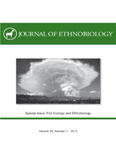
JOURNAL OF ETHNOBIOLOGY
Celebrating the Synergy of Science and TraditionJOURNAL OF ETHNOBIOLOGY, published by SAGE PUBLICATIONS INC, stands at the forefront of interdisciplinary research in the fields of ethnobiology, anthropology, and the biological sciences. With an ISSN of 0278-0771 and an E-ISSN of 2162-4496, this esteemed journal boasts a remarkable impact, categorized as Q1 in both Animal Science and Zoology, Anthropology, and Plant Science as of 2023. Ranking in the top percentiles among its peers on Scopus—29th in Anthropology and 69th in Animal Science—this journal plays a critical role in advancing our understanding of the complex relationships between humans and their biological environments. Covering a wide array of topics from traditional ecological knowledge to conservation strategies, the JOURNAL OF ETHNOBIOLOGY is dedicated to fostering scientific dialogue and innovation. With an emphasis on original research and reviews, the journal serves as an essential resource for researchers, professionals, and students alike, facilitating a deeper comprehension of the intricate networks of life that sustain our planet. The journal's contributions significantly influence both theoretical and practical applications in biodiversity and cultural heritage, making it indispensable for anyone engaged in these vital fields.
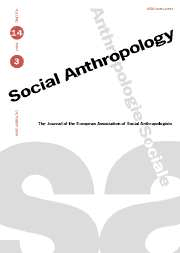
Social Anthropology
Exploring the Tapestry of Human CulturesSocial Anthropology is a leading journal published by BERGHAHN JOURNALS, focusing on the diverse and dynamic field of anthropology. With an ISSN of 0964-0282 and an E-ISSN of 1469-8676, this open-access journal has been a cornerstone of scholarly communication since its inception in 1982, becoming fully accessible to the public since 2022. Situated in the United States, the journal aims to disseminate high-quality research that explores sociocultural dimensions of human behavior across various contexts, addressing pressing contemporary issues through a multidisciplinary lens. With impressive rankings, including Q2 in Anthropology and Arts and Humanities, and strong positions in Sociology and Developmental Psychology according to Scopus metrics, Social Anthropology serves as an essential platform for researchers, professionals, and students committed to advancing our understanding of social practices and cultural norms. Its commitment to fostering intellectual discourse makes it a vital resource for those seeking to deepen their knowledge and insight into the anthropological landscape.
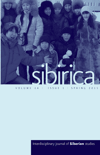
Sibirica-Interdisciplinary journal of Siberian Studies
Bridging Disciplines to Illuminate SiberiaSibirica: Interdisciplinary Journal of Siberian Studies, published by BERGHAHN JOURNALS, is a pioneering open-access journal dedicated to the exploration of Siberian studies through an interdisciplinary lens. Since its launch in 2014, the journal has rapidly established itself as a vital academic resource, evidenced by its impressive rankings in the Scopus database, which include a 75th percentile in History and a 64th percentile in Cultural Studies. Catering to a diverse audience of researchers, professionals, and students, Sibirica engages in critical discussions surrounding the anthropology, culture, history, and social sciences of Siberia, enriching our understanding of this complex region. With a commitment to accessibility since 2020, the journal is poised to foster wider scholarly discourse while offering a platform for innovative research and perspectives. Engaging with Sibirica will not only enhance your academic endeavors but also connect you with a vibrant community dedicated to understanding the multifaceted narratives of Siberia.

Novos Cadernos NAEA
Empowering interdisciplinary dialogue for a sustainable future.Novos Cadernos NAEA is a prominent open-access journal published by Universidade Federal do Pará, dedicated to advancing the field of applied social sciences and environmental studies. Since its inception in 1998, this journal has established itself as a vital platform for researchers and practitioners to disseminate innovative research, engage in scholarly conversations, and promote interdisciplinary approaches to contemporary issues affecting society and the environment. With an ISSN of 1516-6481 and an E-ISSN of 2179-7536, it aims to enhance accessibility to knowledge by ensuring that all articles are freely available online, thereby supporting the global academic community. The journal's commitment to quality research is evident, making it an essential resource for scholars, students, and policymakers looking for cutting-edge analysis and insights in their fields.
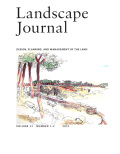
Landscape Journal
Advancing Knowledge in Landscape ConservationWelcome to the Landscape Journal, a prominent publication in the field of Nature and Landscape Conservation, proudly brought to you by University of Wisconsin Press. Since its inception, this journal has strived to underpin the critical interplay between environmental science and landscape architecture, providing a platform for innovative research and comprehensive insights. With an ISSN of 0277-2426 and an E-ISSN of 1553-2704, the Landscape Journal is indexed in leading academic databases and recognized with a 2023 Scopus Rank of #167, placing it in the 21st percentile among its peers. The journal operates from the heart of the United States, featuring converged years from 2009 to 2019 and again from 2021 to 2024, making it a reliable resource for ongoing dialogue in landscape studies. Although it currently does not offer open access, the Landscape Journal remains an essential resource for researchers, professionals, and students dedicated to understanding and enhancing our natural environments. As a Q3 category journal, it invites contributions that push the boundaries of landscape research while fostering environmental stewardship.

AMBIO
Connecting disciplines to shape the future of environmental science.AMBIO, published by Springer, is a prestigious journal that has been at the forefront of environmental research since its inception in 1973. With an ISSN of 0044-7447 and an E-ISSN of 1654-7209, this journal provides a vital platform for the dissemination of interdisciplinary studies that intersect ecology, environmental chemistry, geography, and medicine. Based in the Netherlands, AMBIO holds a remarkable position in the academic world, ranked Q1 in multiple categories, including Ecology and Environmental Chemistry, reflecting its commitment to high-quality scholarly work. Researchers looking to contribute to or stay abreast of significant advancements in understanding and addressing contemporary environmental challenges will find AMBIO to be an essential resource, catering to the needs of a diverse audience comprising scholars, practitioners, and policymakers. While the journal is not open access, its wide-ranging influence in the social sciences, particularly regarding geography and development, alongside its high impact factor, underscores its importance for the future of environmental research.
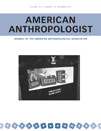
AMERICAN ANTHROPOLOGIST
Connecting scholars to a world of anthropological insights.American Anthropologist is a prestigious journal published by Wiley, dedicated to advancing the field of anthropology. With a rich publishing history dating back to 1888, it has become a leading platform for scholarly discourse, showcasing innovative research and diverse perspectives from around the globe. The journal holds impressive ranks within its categories, being recognized as Q1 in both Anthropology and Arts and Humanities, alongside a notable Scopus ranking of #36 out of 502 in Social Sciences. Its robust impact in academia is reflected in its emphasis on interdisciplinary approaches that resonate within the fields of social science and humanities. Researchers and students alike are encouraged to contribute to this vital resource that continues to shape anthropological thought and practice. For those interested, the journal is tailored for non-open access, ensuring the curation of high-caliber scholarly work accessible to a wide audience while supporting the standards of peer-reviewed publications.
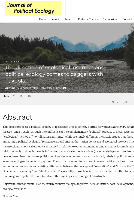
Journal of Political Ecology
Challenging Perspectives on Ecological and Political DynamicsJournal of Political Ecology is a prestigious, open-access publication that has been at the forefront of interdisciplinary scholarship since 1994, hosted by UNIV ARIZONA LIBRARIES in the United States. This journal, identifiable by its ISSN 1073-0451, focuses on critical analyses of environmental issues as they intersect with social and political factors, making it an essential resource for researchers in the fields of Political Science, Geography, and Ecology. As of 2023, it boasts impressive rankings including Q1 in Geography, Planning and Development and Political Science and International Relations, highlighting its significant impact in these categories. Additionally, the journal ranks in the 86th percentile for Political Science and International Relations, further solidifying its position as a leading publication. The convergence of its content from 2011 to 2024 reflects a commitment to exploring contemporary environmental challenges through a political lens, catering to an audience of academics, practitioners, and students. With its strong reputation and commitment to open access, the Journal of Political Ecology is an invaluable platform for advancing scholarly discourse in an increasingly complex and interconnected world.

Evolutionary Human Sciences
Advancing Knowledge at the Intersection of Evolution and HumanityEvolutionary Human Sciences, published by Cambridge University Press, is a premier open-access journal dedicated to exploring the multidisciplinary intersections of human evolution and behavior. Established in 2019, this journal has swiftly gained recognition, ranking in the Q1 category for Anthropology, Cultural Studies, and Ecology, Evolution, Behavior and Systematics, along with Q2 in Applied Psychology as of 2023. With a commendable Scopus ranking and impact factor reflecting its rigorous academic standards, Evolutionary Human Sciences provides a vital platform for researchers and professionals keen to advance the understanding of human behavior through the lens of evolutionary science. By offering a wealth of open access options, it ensures that groundbreaking research is readily available to scholars, students, and practitioners worldwide, fostering the dissemination of knowledge that is crucial for addressing contemporary challenges in human behavior and ecology.